樊景立-组织公民行为量表、组织公平量表
职业健康心理学研究的因变量
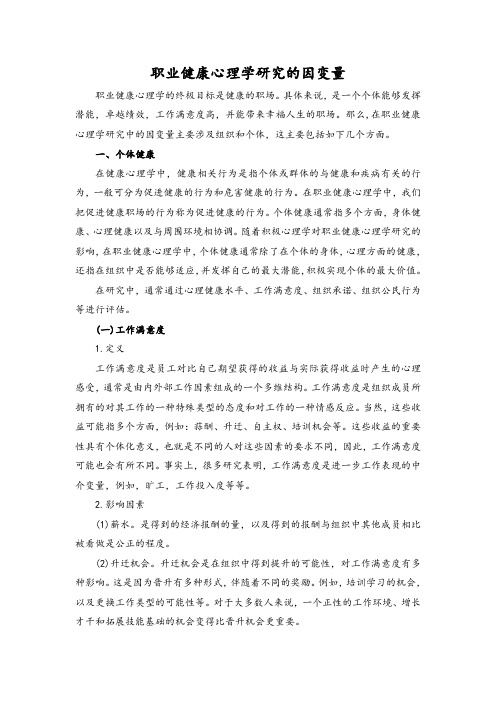
职业健康心理学研究的因变量职业健康心理学的终极目标是健康的职场。
具体来说,是一个个体能够发挥潜能,卓越绩效,工作满意度高,并能带来幸福人生的职场。
那么,在职业健康心理学研究中的因变量主要涉及组织和个体,这主要包括如下几个方面。
一、个体健康在健康心理学中,健康相关行为是指个体或群体的与健康和疾病有关的行为,一般可分为促进健康的行为和危害健康的行为。
在职业健康心理学中,我们把促进健康职场的行为称为促进健康的行为。
个体健康通常指多个方面,身体健康、心理健康以及与周围环境相协调。
随着积极心理学对职业健康心理学研究的影响,在职业健康心理学中,个体健康通常除了在个体的身体,心理方面的健康,还指在组织中是否能够适应,并发挥自己的最大潜能,积极实现个体的最大价值。
在研究中,通常通过心理健康水平、工作满意度、组织承诺、组织公民行为等进行评估。
(一)工作满意度1.定义工作满意度是员工对比自己期望获得的收益与实际获得收益时产生的心理感受,通常是由内外部工作因素组成的一个多维结构。
工作满意度是组织成员所拥有的对其工作的一种特殊类型的态度和对工作的一种情感反应。
当然,这些收益可能指多个方面,例如:蒜酬、升迁、自主权、培训机会等。
这些收益的重要性具有个体化意义,也就是不同的人对这些因素的要求不同,因此,工作满意度可能也会有所不同。
事实上,很多研究表明,工作满意度是进一步工作表现的中介变量,例如,旷工,工作投入度等等。
2.影响因素(1)薪水。
是得到的经济报酬的量,以及得到的报酬与组织中其他成员相比被看做是公正的程度。
(2)升迁机会。
升迁机会是在组织中得到提升的可能性,对工作满意度有多种影响。
这是因为晋升有多种形式,伴随着不同的奖励。
例如,培训学习的机会,以及更换工作类型的可能性等。
对于大多数人来说,一个正性的工作环境、增长才干和拓展技能基础的机会变得比晋升机会更重要。
(3)上级的支持。
就是上级提供技术帮助和行为支持的能力。
影响工作满意度的上级管理的风格有两个维度:一是员工中心性,可以通过上级对于员工的个人关注程度来测量。
樊景立 组织公民行为量表组织公平量表
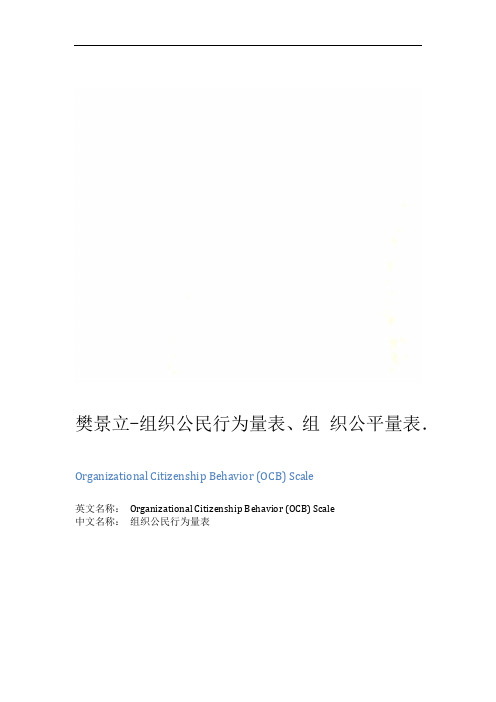
樊景立-组织公民行为量表、组织公平量表.Organizational Citizenship Behavior (OCB) Scale英文名称:Organizational Citizenship Behavior (OCB) Scale中文名称:组织公民行为量表作者:Farh, J. L., Earley, P. C., & Lin, S. C.出处:Farh, J. L., Earley, P. C., & Lin, S. C. “Impetus for action: A cultural analysis of justice and organizational citizenship behavior in Chinese society.”Administrative Science Quarterly, 1997, 42, 421-444.简介:条目:部属的工作行为:以下列叙述来描述他(她)的行为您是否同意?请逐项阅读后填答。
1-非常不同意5-有点同意2-相当不同意6-相当同意3-有点不同意7-非当同意4-不能确定Identification with the company认同组织Eager to tell outsiders good news about the company and clarify their misunderstandings主动对外介绍或宣传公司优点,或澄清他人对公司的误解。
Willing to stand up to protect the reputation of the company.努力维护公司形象,并积极参与有关活动。
Makes constructive suggestions that can improve the operation of the company. 主动提出建设性的改善方案,供公司有关单位参考。
.Actively attends company meetings.以积极的态度参与公司内相关会议。
组织公民行为理论及其应用研究
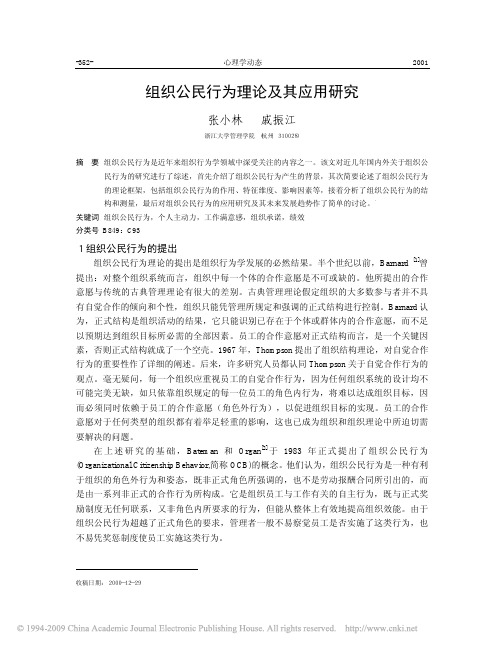
组织公民行为理论及其应用研究张小林戚振江浙江大学管理学院 (杭州 310028) 摘要组织公民行为是近年来组织行为学领域中深受关注的内容之一。
该文对近几年国内外关于组织公民行为的研究进行了综述,首先介绍了组织公民行为产生的背景,其次简要论述了组织公民行为的理论框架,包括组织公民行为的作用、特征维度、影响因素等,接着分析了组织公民行为的结构和测量,最后对组织公民行为的应用研究及其未来发展趋势作了简单的讨论。
⋅关键词组织公民行为,个人主动力,工作满意感,组织承诺,绩效分类号 B849:C931 组织公民行为的提出 组织公民行为理论的提出是组织行为学发展的必然结果。
半个世纪以前,Barnard [1]曾提出:对整个组织系统而言,组织中每一个体的合作意愿是不可或缺的。
他所提出的合作意愿与传统的古典管理理论有很大的差别。
古典管理理论假定组织的大多数参与者并不具有自觉合作的倾向和个性,组织只能凭管理所规定和强调的正式结构进行控制。
Barnard认为,正式结构是组织活动的结果,它只能识别已存在于个体或群体内的合作意愿,而不足以预期达到组织目标所必需的全部因素。
员工的合作意愿对正式结构而言,是一个关键因素,否则正式结构就成了一个空壳。
1967年,Thompson提出了组织结构理论,对自觉合作行为的重要性作了详细的阐述。
后来,许多研究人员都认同Thompson关于自觉合作行为的观点。
毫无疑问,每一个组织应重视员工的自觉合作行为,因为任何组织系统的设计均不可能完美无缺,如只依靠组织规定的每一位员工的角色内行为,将难以达成组织目标,因而必须同时依赖于员工的合作意愿(角色外行为),以促进组织目标的实现。
员工的合作意愿对于任何类型的组织都有着举足轻重的影响,这也已成为组织和组织理论中所迫切需要解决的问题。
在上述研究的基础,Bateman和Organ[2]于1983年正式提出了组织公民行为(Organizational Citizenship Behavior,简称OCB)的概念。
组织公平与组织公民行为_组织承诺的调节作用实证研究
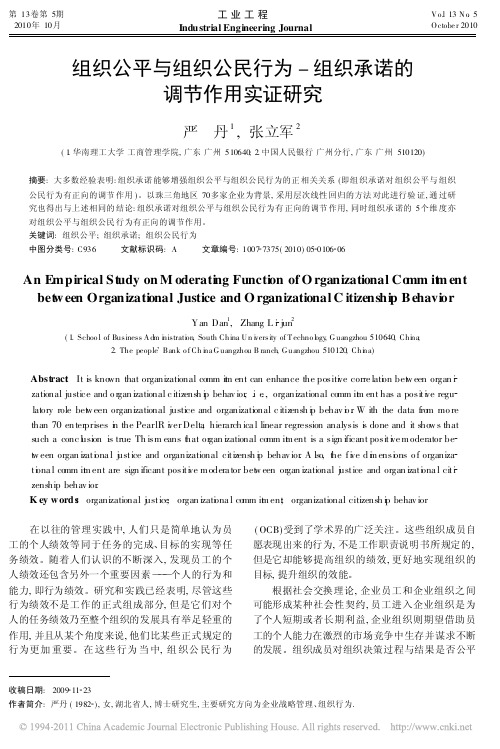
第13卷第5期2010年10月工业工程Industrial Engineering JournalV o.l 13N o .5O ctobe r 2010收稿日期:2009 11 23作者简介:严丹(1982 ),女,湖北省人,博士研究生,主要研究方向为企业战略管理、组织行为.组织公平与组织公民行为-组织承诺的调节作用实证研究严 丹1,张立军2(1.华南理工大学工商管理学院,广东广州510640;2.中国人民银行广州分行,广东广州510120)摘要:大多数经验表明:组织承诺能够增强组织公平与组织公民行为的正相关关系(即组织承诺对组织公平与组织公民行为有正向的调节作用)。
以珠三角地区70多家企业为背景,采用层次线性回归的方法对此进行验证,通过研究也得出与上述相同的结论:组织承诺对组织公平与组织公民行为有正向的调节作用,同时组织承诺的5个维度亦对组织公平与组织公民行为有正向的调节作用。
关键词:组织公平;组织承诺;组织公民行为中图分类号:C936 文献标识码:A 文章编号:1007 7375(2010)05 0106 06An Empirical Study on M oderati ng Functi on of O rganizational Co mm it m ent bet w een Organizati onal Justice and O rganizational C itizenshi p B ehavi orYan Dan 1,Zhang L i jun2(1.Schoo l of Business A d m i nistrati on ,South China U n i versity of T echno l ogy ,G uangzhou 510640,Chi na ;2.The people Bank o f Ch i na G uangzhou B ranch ,G uangzhou 510120,Chi na)Abst ract :It is kno wn that organizational co mm it m ent can enhance the positi v e corre lati o n bet w een organ i zational justice and o r gan izational c itizensh i p behav ior ,.i e .,organizational co mm it m ent has a positi v e regu latory role bet w een organizational justice and organizational c itizensh i p behav i o r .W ith the data fro m mo re than 70en ter prises i n the PearlR i v er Delta ,hierarch ica l linear regression analysis i s done and it sho w s thatsuch a conc l u sion is true .Th ism eans t h at or gan izational co mm it m ent is a sign ificant positi v e m oderator be t w een organ izati o na l j u stice and organizational citizensh i p behav ior .A lso ,t h e fi v e d i m ensi o ns o f organiza ti o na l co mm it m ent are sign ificant positi v e m odera tor bet w een or gan izational j u stice and organ izati o na l citi zenship behav ior .K ey w ords :organizational j u stice ;organ izati o na l co mm it m en;t organizational citizensh i p behav ior 在以往的管理实践中,人们只是简单地认为员工的个人绩效等同于任务的完成、目标的实现等任务绩效。
预算助人行为:构念与量表

预算助人行为:构念与量表高严;朱晓波【摘要】作为预算过程中组织公民行为的一种重要表现形式,预算助人行为本质上是预算执行人在帮助他人完成预算任务或者相关工作时的行为.我们不仅要对这一理论范畴进行构念界定,从质的规定性上区别于其他预算组织公民行为,还必须为进一步的定量研究提供测量工具.在文献回顾、理论分析后,通过深度访谈和焦点座谈,整理了预算助人行为的8个测试题项,以459份调查问卷为测量工具,运用EFA和CFA分析,获得三个维度,以及对应的8个正式题项,构建了基于本土情境的预算助人行为量表,并阐述了其应用价值.【期刊名称】《会计之友》【年(卷),期】2017(000)017【总页数】4页(P12-15)【关键词】预算助人行为;组织公民行为;预算管理【作者】高严;朱晓波【作者单位】新疆财经大学会计学院;新疆财经大学会计学院【正文语种】中文【中图分类】F811.3预算是管理会计中研究最广泛的课题之一,涉及到管理会计的方方面面(Covaleski,2003)。
然而在预算实践中却难觅成功的范例,而对它的非议和质疑却甚嚣尘上。
究其原因固然许多,但对预算管理过程中忽略所涉及的人的行为因素,无疑是重要的一个方面。
正如Gary Cokins(2014)所指出的,管理会计必须引入社会学、行为学和心理学的方法,才有可能在实质上提高其效率。
在预算契约的签订和执行中,预算个体既是预算的制定人、执行人,也是相关预算信息的使用人。
由于预算个体之间效用的差异性,会导致预算个体表现出不同的预算行为,进而会对企业的预算管理造成不同程度的影响。
考虑到先前的文献很少涉及预算相关行为的研究,也没有可供使用的测量工具,本文旨在借鉴组织公民行为(Organizational Citizenship Behavior,OCB)的大量研究成果,探讨预算个体助人行为的前因及后果,理清其理论边界,并开发能够用于测度的量表。
(一)理论和文献印象管理理论认为,人们通常喜欢比较美好的事物,希望展现出他们积极向上的态度(Baumeister,1982),人们通常会在工作中采用帮助他人的方式,来给他人留下一个比较好的印象(Leary& Kowalski,1990),管理者的助人行为会给他们带来好的评价,这对企业的绩效评估有正面的影响(Allen and Rush,1998)。
《组织公民行为》课件

目录
• 组织公民行为概述 • 组织公民行为的类型 • 组织公民行为的影响因素 • 如何提升组织公民行为 • 组织公民行为与组织绩效的关系 • 案例分析
01
组织公民行为概述
定义与特点
定义
组织公民行为是指在组织正式的 薪酬体系中未明确规定,但能够 对组织或个人产生积极影响的自 觉、自发的个体行为。
领导风格
01
02
03
变革型领导
变革型领导风格能够激发 员工的内在动机和自我发 展,从而促进组织公民行 为的表现。
服务型领导
服务型领导关注员工的需 要和发展,通过提供支持 和资源来促进员工的组织 公民行为。
情境领导
根据员工的成熟度和需求 ,采取不同的领导风格, 能够更好地激发员工的组 织公民行为。
工作环境
自我效能感强的员工对自己的能 力有信心,更愿意主动承担责任 和参与组织活动。
组织文化
团队合作
组织文化中强调团队合作和互相支持,能够激发员工表现出更多 的组织公民行为。
创新氛围
鼓励创新和接受新思想的组织文化,能够激发员工的主动性和创造 性,从而表现出更多的组织公民行为。
公正与公平
组织文化中强调公正和公平,能够提高员工的满意度和忠诚度,从 而增加组织公民行为。
详细描述
某公司注重组织文化建设,通过倡导诚信、创新、团结等价值观,营造积极向 上的工作氛围。同时,公司还鼓励员工之间的交流和合作,促进信息的流通和 知识的共享,提高组织的创新能力和竞争力。
感谢您的观看
THANKS
的共赢。
组织公民行为与绩效的关系
正向关系
组织公民行为对个人绩效和组织绩效具有正 向影响,能够提高个人和组织的工作效率和 质量。
组织公平量表(OJS)

组织公平量表(Organizational Justice Scale,简称OJS),概念源自Homans(1961)提出的社会交换理论中,提及个体于社会交换过程之中,期望付出与获得之间能够公平分配。
Niehoff 与Moorman(1993)将组织公平量表,分为三个维度,包含:(1)分配公平(Distributional justice):意指员工知觉其工作任务及薪酬分配的方式是否公平的程度;(2)程序公平(Procedural justice):意指员工知觉组织制定决策的程序与过程是否公平的程度;(3)互动公平(Interactional justice),意指员工知觉组织领导于决策的过程互动沟通是否公平的程度,量表总共为20个条目。
计分方式将受试者感受、反应及认同程度为评定指标,采用五点量表级分方法。
其标准为“1”表示非常不同意;“2”表示不同意;“3”表示普通;“4”表示同意;“5”表示非常同意。
量表的条目一、分配公平1. 我的工作排班是公平的。
①非常不同意②不同意③普通④同意⑤非常同意2. 我认为我的薪酬水平是合理的。
①非常不同意②不同意③普通④同意⑤非常同意3. 我认为我的工作负荷量相当公平。
①非常不同意②不同意③普通④同意⑤非常同意4. 我觉得我的工作职责是公平的。
①非常不同意②不同意③普通④同意⑤非常同意5. 总体而言,我在公司获得的报酬相当公平。
①非常不同意②不同意③普通④同意⑤非常同意二、程序公平6. 领导会以公正的态度做出工作决定。
①非常不同意②不同意③普通④同意⑤非常同意7. 领导会在工作决定前听取所有员工的意见。
①非常不同意②不同意③普通④同意⑤非常同意8. 领导会在工作决定前收集准确完整的信息。
①非常不同意②不同意③普通④同意⑤非常同意9. 领导会应员工的要求说明决定原因并提供额外信息。
①非常不同意②不同意③普通④同意⑤非常同意10. 所有的工作决定无论对谁都前后一致。
樊景立版的组织公民行为量表
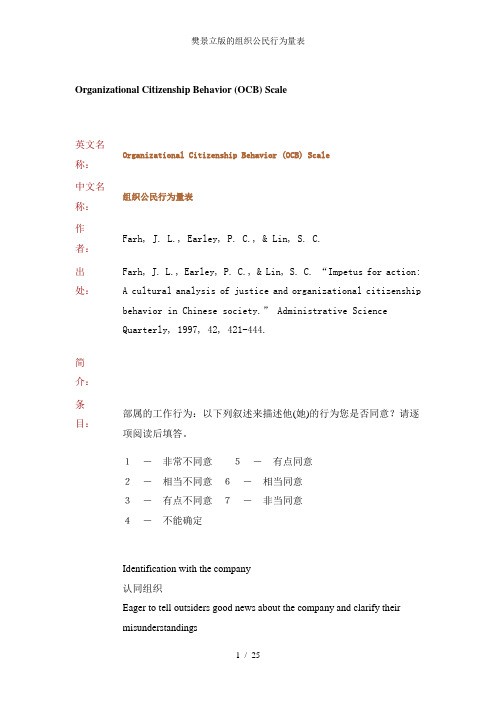
Organizational Citizenship Behavior (OCB) Scale英文名称:Organizational Citizenship Behavior (OCB) Scale 中文名称:组织公民行为量表作者:Farh, J. L., Earley, P. C., & Lin, S. C.出处:Farh, J. L., Earley, P. C., & Lin, S. C. “Impetus for action: A cultural analysis of justice and organizational citizenship behavior in Chinese society.” Administrative Science Quarterly, 1997, 42, 421-444.简介:条目:部属的工作行为:以下列叙述来描述他(她)的行为您是否同意?请逐项阅读后填答。
1-非常不同意5-有点同意2-相当不同意6-相当同意3-有点不同意7-非当同意4-不能确定Identification with the company认同组织Eager to tell outsiders good news about the company and clarify their misunderstandings主动对外介绍或宣传公司优点,或澄清他人对公司的误解。
Willing to stand up to protect the reputation of the company.努力维护公司形象,并积极参与有关活动。
Makes constructive suggestions that can improve the operation of the company.主动提出建设性的改善方案,供公司有关单位参考。
Actively attends company meetings.以积极的态度参与公司内相关会议。
- 1、下载文档前请自行甄别文档内容的完整性,平台不提供额外的编辑、内容补充、找答案等附加服务。
- 2、"仅部分预览"的文档,不可在线预览部分如存在完整性等问题,可反馈申请退款(可完整预览的文档不适用该条件!)。
- 3、如文档侵犯您的权益,请联系客服反馈,我们会尽快为您处理(人工客服工作时间:9:00-18:30)。
樊景立-组织公民行为量表、组织公平量表Orga ni zati onal Citize nship Behavior (OCB) Scale英文名称:Orga ni zatio nal Citize nship Behavior (OCB) Scale中文名称:组织公民行为量表 作 者:Farh, J. L., Earley, P C., & Lin, S. C.出处:Farh, J. L., Earley, P C., & Lin, S. C. “ Impetusfor action: A cultural analysis of j ustice and orga ni zati onal citize nship behavior in Chin ese rative ScienceQuarterly, 1997, 42, 421-444.简介:条目:以下列叙述来描述他(她)的行为您是否同意?请逐项阅读后填答。
4 —不能确定Identification with the company认同组织Eager to tell outsiders good n ews about the compa ny and clarify their mis un dersta ndings 主动对外介绍或宣传公司优点,或澄清他人对公司的误解。
Willi ng to sta nd up to protect the reputati on of the compa ny.努力维护公司形象,并积极参与有关活动。
Makes con structive suggesti ons that can improve the operati on of the comp any.主动提出建设性的改善方案,供公司有关单位参考Actively atte nds compa ny meet in gs.以积极的态度参与公司内相关会议。
Altruism toward colleagues协助同事Willi ng to assist new colleagues to adjust to the work en vir onment.society. Administ 部属的工作行为: 1 —非常不同意 5 —有点同意 2 —相当不同意 6 —相当同意 3 —有点不同意7 —非当同意主动帮助新进同仁适应工作环境。
Willi ng to help colleague solve work-related problems.乐意协助同仁解决工作上的困难。
Willi ng to cover work assig nments for colleague whe n n eeded.主动分担或代理同事之工作。
Willi ng to coordi nate and com muni cate with colleagues.主动与同事协调沟通。
Impers onal harm ony不生事争利(人际和睦)Often speaks ill of the supervisor or colleagues behind their backs. (R)经常在背后批评主管或谈论同事之隐私。
(R)Uses illicit tactics to seek pers onal in flue nce and gain with harmful effect onin terpers onal harm ony in the orga ni zati on. (R)在公司内争权夺利,勾心斗角,破坏组织和谐。
(R)Uses positi on power to pursue selfish pers onal gain. (R)假公济私,利用职权谋取个人利益。
(R)Takes credits, avoids blames, and fights fiercely for personal gain. (R)斤斤计较,争功诿过,不惜抗争以获得个人利益。
(R)Protect ing compa ny resources公私分明Con ducts pers onal bus in ess on compa ny time (e.g., tradi ng stocks, shopp ing, going to barber shops). (R)利用上班时间处理私人事务,如买股票,跑银行,逛街,购物,上理容院•••等。
(R)Uses compa ny resources to do pers onal bus in ess (e.g., compa ny phon es, cop y machi nes, computers, and cars). (R)利用公司资源处理私人事务,如:私自利用公电话,复印机,计算机,公务车• • •等。
(R)Views sick leave as ben efit and makes excuse for tak ing sick leave. (R) 经常借口请假,视为福利。
(R)Con scie ntious ness敬业守法Ofte n arrives early and starts to work immediately.上班时经常提早到达,并着手处理公务。
Takes one ' s job seriously and rarely makes mistakes.工作认真,并且很少出差错。
Complies with compa ny rules and procedures eve n whe n n obody watches a nd no evide nee can be traced.即使无人注意或无据可查时,亦随时遵守公司规定。
Does not mi nd tak ing new or challe nging assig nmen ts.从不挑选工作,尽可能接受新的或困难的任务。
Tries hard to self-study to in crease the quality of work outputs.为提升工作品质,而努力自我充实。
信度:效度:备注:Orga ni zati onal Justice Scale英文名称:Orga nizatio nal Justice Scale中文名称:组织公平量表作者:Jason A. Colquitt出处:Colquitt, J. A. (2001). "On the Dimensionality of Organizational Justice: A Con struct Validati on of a Measure."Journal of Applied Psychology 86(3):386-400条目:Procedural justiceThe following items refers to the procedures used to arrive at your(outcome). To what exte nt:1.Have you been able to express your views and feelings during these procedures?2.Have you had in flue nces over the (outcome) arrived at by those procedures?3.Have those procedures bee n applied con siste ntly?4.Have those procedures bee n free of bias?5.Have those procedures bee n based on accurate in formati on?6.Have you been able to appeal the (outcome) arrived at by those procedures?7.Have those procedures upheld ethical and moral sta ndards?Distributive justiceThe followi ng items refer to your (outcome). To what exte nt:1.Dos your (outcome) reflect the effort you have put into your work?2.Is your (outcome) appropriate for the work you have completed?3.Does your (outcome) reflect what you have contributed to the orga nizati on?4.1s your (outcome) justified, give n your performa nee?In terpers onal justiceThe following items refer to (the authority figure who enacted theprocedure). To what exte nt:1.Has (he/she) treated you in a polite mann er?.2.Has (he/she) treated you with dig ni ty?3.Has (he/she) treated you with respect?4.Has (he/she) refra ined from improper remarks or comme nts?In formati onal justiceThe following items refer to (the authority figure who enacted theprocedure). To what exte nt:1.Has (he/she) bee n can did in (his/her) com muni cati on with you?2.Has (he/she) expla ined the procedures thoroughly?3.Were (his/her) expla nati ons regard ing the procedures reas on able?4.Has (he/she) com muni cated details in a timely manner?5.Has (he/she) seemed to tailor (his/her) com muni cati ons to in dividuals specific n eeds?信度:效度:备注:Procedural Justice英文名称:Procedural Justice中文名称:程序公平作者:Farh, J.-L., P C. Earley, et al.出处:Farh, J.-L., P C. Earley, et al. (1997). "Impetus for action: A cultural analysis of justice and..." Administrative Scienee Quarterly 42(3): 421.简介:条目:Farh, J.-L., P. C. Earley, et al. (1997). "Impetus for action: A culturalanalysis of justice and..." Administrative Scienee Quarterly 42(3): 421.The sample for this study consisted of employees drawn from eight compa nies in the electr onics in dustry of Taiwa n. All eight compa nies were locally owned and were members of the 500 largest compa nies in Taiwa n.Thirty to forty matching questionnaires were distributed to supervisors and subord in ates in each compa ny. The sample con sisted main ly of low to mid-level man agers, engin eers, salespers ons, and clerical staff.Participatio n1.Managers at all levels participate in pay and performanee appraisaldecisi ons;2.Through various channels, my company tries to understand employees ' opinions regard ing pay and performa nee appraisal policies and decisi ons.3.Pay decisions are made exclusively by top management in my company; others are excluded from this process; (R)4.My compa ny does not take employees ' opinions into acco unt in desig ning pay and performa nee appraisal policies. (R) Cron bach alpha was .717-po int scale (1=str on gly disagree, 7=str on gly agree)Appeal Mecha nism The compa ny has a formal appeal cha nn el;The company imposes a time limit within which the responsible parties must resp ond to the employee' appeal;Employees ' questions concerning pay or performanee appraisal are usuallyan swered promptly and satisfactorily. Cron bach alpha was .817-po int scale (1=str on gly disagree, 7=str on gly agree)信度:Cron bach alpha was .71 7-po int scale (1=str on gly disagree, 7=stro ngly agree)效度:备注:Justice Scale英文名称:Justice Scale中文名称:公平问卷作者:Niehoff, B. P., & Moorman, R. H.出处:Niehoff, B. P, & Moorman, R. H. (1993). Justice as a mediator of the relati on ship betwee n methods of mon itori ng and orga ni zati onal citize nship behaviors. Academy of Man ageme nt Journ al,36(3), 527-556.简介:条目:Sample: The employees and gen eral man agers of a n ati onal movie theater management company that operated 11 theaters in a large southwestern city were studied. The employees (N = 213) averaged 19.9 years of age and nearly two years of experienee working in the theaters. A majority had completed high school, but only 17 percent had completed college. Each theater was under the authority of a general manager; thus, 11 general managers took part in the study. The number of employees per theater varied from 15 to 45. At each locati on, a group of assista nt man agers aided the general manager in the operation of the theater, but there were no direct li nes of authority betwee n these assista nts and specific employees. In fact, the vice preside nt for huma n resources described the assista nt man agers as a pool of assista nts who coul d be assig ned to any shift on any day. The one con sta nt at each theater was that each gen eral man ager hadultimate responsibility for the operation and was on-site for most of thetheater's hours of bus in ess. The assista nt man agers were not in cluded in the data for this study.The employees completed a survey describing their perceptions of distributive and procedural justice and the monitoring behaviors of theirgeneral manager. Since the assistant managers worked various shifts but the gen eral man agers rema ined on-site for most of the worki ng hours, we considered the general managers the appropriatereferents for themeasurement of leader monitoring behaviors. The general managersprovided data for the measures of organizational citizenship behavior;some gen eral man agers assessed OCB for 15 employees, and some assessed 45 employees.All surveys were completed on company time. Since data were being collected from two sources, employees and gen eral man agers, we asked all participants to put their names on the surveys but took precautions to in sure confid en tiality. Each employee received an env elope in which to seal the completed survey and mailed it directly to us. In total, 213 out of 260 employee surveys were returned for a response rate of 81 percent. Conv ersati ons with the compa ny's vice preside nt for huma n resources suggested that the demographic characteristics of the resp ondents reflected those of the gen eral populati on of employees at the theaters.All items used a seve n-po int resp onse format.Distributive justice1.My work schedule is fair.2.I thi nk that my level of pay is fair.3.I con sider my work load to be quite fair.4.Overall, the rewards I receive here are quite fair.5.I feel that my job resp on sibilities are fair.Formal procedures1.Job decisi ons are made by the gen eral man ager in an un biased manner.2.My general manager makes sure that all employee concerns are heard before job decisi ons are made.3.To make job decisions, my general manager collects accurate and complete in formatio n.4.My general manager clarifies decisions and provides additional in formatio n whe n requested by employees.5.All job decisi ons are applied con siste ntly across all affected empl oyees.6.Employees are all owed to challenge or appeal job decisions made by the gen eral man ager.In teract ional justice1.When decisions are made about my job, the general manager treats me with kindn ess and con sideratio n.2.When decisions are made about my job, the general manager treats me with respect and dig nity.3.Whe n decisi ons are made about my job, the gen eral man ager is sen sitiveto my pers onal n eeds.4.Whe n decisi ons are made about my job, the gen eral man ager deals withme in a truthful manner.5.When decisions are made about my job, the general manager shows concern for my rights as an employee.6.Concerning decisi ons made about my job, the gen eral man ager discussesthe implicati ons of the decisi ons with me.7.The general manager offers adequate justification for decisions made about my job.8.When making decisions about my job, the general manager offers expla nati ons that make sense to me.9.My general manager explains very clearly any decision made about my job.信度:The CFI for the three justice dimensions was .92. This scale was based on one used by Moorman (1991) and had reported reliabilities above .90 for all three dime nsions. 效度:备注:OCB Scale英文名称:OCB Scale中文名称:组织公民行为问卷作者:Niehoff, B. P., & Moorman, R. H.出处:Niehoff, B. P ., & Moorman, R. H. (1993). Justice as a mediator of the relati on ship betwee n methods of mon itori ng and orga ni zati onal citize nship behaviors. Academy of Man ageme nt Journ al, 36(3), 527-556.简介:条目: Sample: The employees and general managers of a national movie theater management company that operated 11 theaters in a largesouthwestern city were studied. The employees (N = 213) averaged 19.9 years of age and n early two years of experie nee worki ng in the theaters. A majority had completed high school, but only 17 percent had completed college. Each theater was un der the authority of a gen eral man ager; thus,11 general managers took part in the study. The number of employees per theater varied from 15 to 45. At each location, a group of assistant managers aided the general manager in the operation of the theater, but there were no direct li nes of authority betwee n these assista nts and specific employees.In fact, the vice preside nt for huma n resources described the assista nt man agers as a pool of assista nts who coul d be assig ned to any shift on any day. The one con sta nt at each theater was that each gen eral man ager hadultimate responsibility for the operation and was on-site for most of thetheater's hours of bus in ess. The assista nt man agers were not in cluded in the data for this study.The employees completed a survey describing their perceptions of distributive and procedural justice and the monitoring behaviors of their general manager. Since the assistant managers worked various shifts but the gen eral man agers rema ined on-site for most of the worki ng hours, we considered the general managers the appropriate referents for the measurement of leader monitoring behaviors. The general managersprovided data for the measures of organizational citizenship behavior;some gen eral man agers assessed OCB for 15 employees, and some assessed 45 employees.All surveys were completed on company time. Since data were being collected from two sources, employees and gen eral man agers, we asked all participants to put their names on the surveys but took precautions to in sure confid en tiality. Each employee received an env elope in which to seal the completed survey and mailed it directly to us. In total, 213 out of 260 employee surveys were returned for a response rate of 81 percent.Conv ersati ons with the compa ny's vice preside nt for huma n resources suggested that the demographic characteristics of the resp ondents reflected those of the gen eral populati on of employees at the theatersAltruism1.Helps others who have heavy work loads.2.Helps others who have bee n abse nt.3.Willingly gives of his/her time to help others who have work related problems.4.Helps orie nt new people eve n though it is not required.Courtesy1.Con sults with me or other in dividuals who might be affected by his/her actions or decisi ons.2.Does not abuse the rights of others.3.Takes steps to preve nt problems with other workers.rms me before taking any important actions.Sportsma nship1.Con sumes a lot of time complai ning about trivial matters. (R)2.Tends to make "mountains out of molehills" (makes problems bigger than they are). (R)3.Con sta ntly talks about wanting to quit his/her job. (R)4.Always focuses on what's wrong with his/her situati on, rather tha n thepositive side of it. (R)Con scie ntious ness1.Is always pun ctual.2.Never takes long lun ches or breaks.3.Does not take extra breaks.4.Obeys company rules, regulations and procedures even when no one is watch ing.Civic virtue1.Keeps abreast of cha nges in the orga ni zati on.2.Atte nds functions that are not required, but that help the compa ny image.3.Attends and participates in meetings regarding the organization.4."Keeps up" with developme nts in the compa ny.Items deno ted with ( R ) are reverse scored.信度:The reliabilities were over .70 for each dimension, and all items used a seve n-po int resp onse format.效度:备注:ognition-and affect -based trust英文名称:cog niti on-and affect-based trust中文名称:基于情感和认知的信任作者:Kok-Yee Ng (黄国燕)and Roy Y. J. Chua (蔡泳瑜)出处:Management and Organization ReviewVolume 2 Page 43 - March 2006doi:10.1111/j.1740-8784.2006.00028.x Volume 2 Issue 1简介:条目:Do I con tribute more whe n I trust more? Differe ntial effects ofcog niti on-and affect-based trustKok-Yee Ng (黄国燕)and Roy Y. J. Chua (蔡泳瑜)基于McAllister (1995)的信任量表基于情感的信任1•你能够与他们自由地分享想法、感受和希望。
